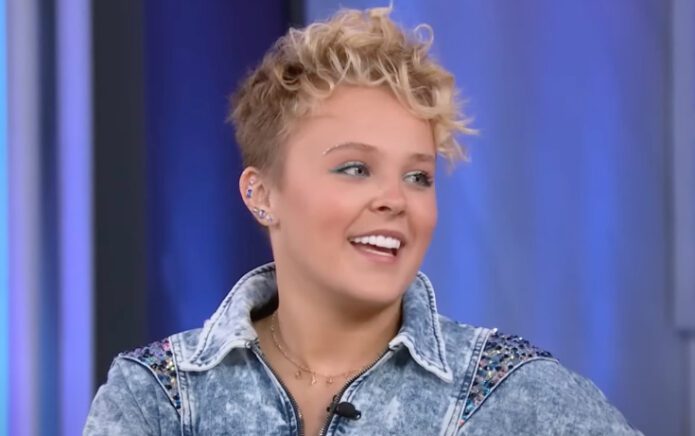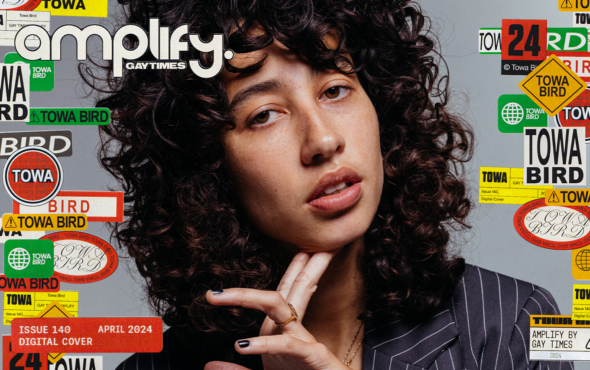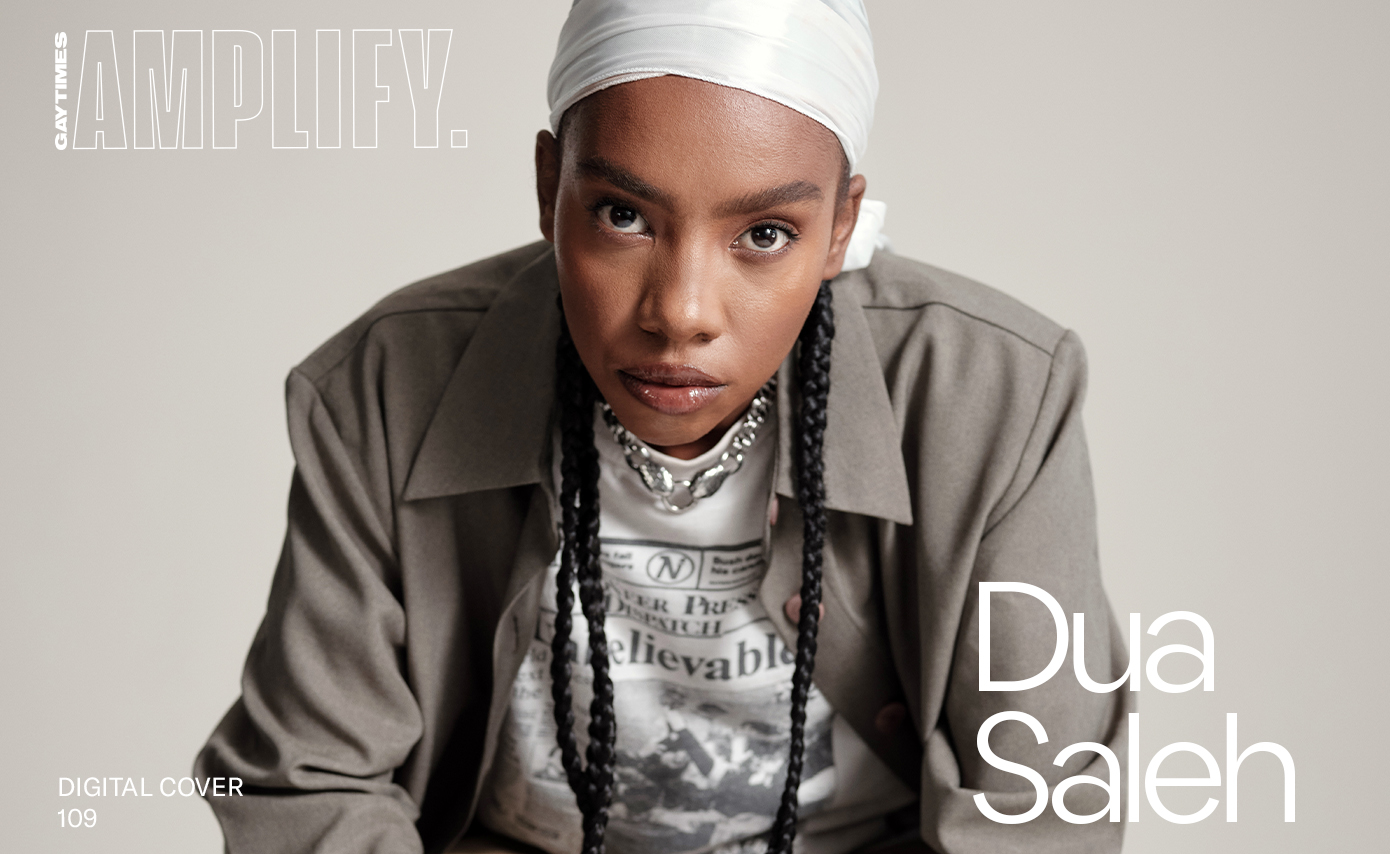
Season three of the award-winning Netflix series Sex Education is on its way. The new chapter of the show promises plenty; new characters, new school rules, and new ways to cause chaos. Filmed in South Wales, season three safely sticks to its working formula: blooming romances, quirky comedy, and fail-safe scripting. It’s no surprise the drama has become a fan favourite. And in its latest venture, Sex Education has added a couple of fresh faces to Moordale High. One of the new students enrolling this term is rising star Dua Saleh; an upcoming talent who has made a name for themselves through sharp songwriting, crossing lines between religion and queerness. Sex Education marks their acting debut as they bring a much-needed dose of mayhem to the classroom.
Born in Kassala, eastern Sudan, Dua’s journey to the small screen has been an unconventional one. The artist and their family had fled their homeland’s civil war before living in an Eritrea refugee camp. Throughout their childhood, Dua then moved through various US states, before settling in Minnesota. Much like their Sex Education character, Cal, Dua resonates with being uprooted from home and embarking on a new beginning. “Cal is an American teenager and they’re non-binary. They’re a skater, a stoner, and they have a lot of anxiety, but they hide it well,” the 26-year-old tells us over Zoom, from the US. Dua and Cal have a lot in common. Both are non-binary, they each have deep political ideals, and an affinity with fashion: “They care a lot about liberty, freedom and people being able to express themselves in the right way, or in the way that’s best for them.
Whether it be artmaking, gender identity, gender expression, Cal cares a lot about people being able to just be themselves, which is really radical.” The first glimpses of Cal on-screen are striking; viewers are greeted with a character wrapped in an outfit that boldly represents themselves, before it’s traded out for an unflattering school uniform. We ask Dua how fashion weaves into their own self-expression. “I like the baggy clothes that Cal wears. I could go into all that drama, but, currently, right now, I’m wearing a binder. I wear a lot of men’s clothes,” they say, showing their dark shirt on screen. “I don’t always wear a binder. I think the way that trans people cultivate their self-expression is ritualistic, especially when people get into like their own cultural backgrounds and the things that they saw growing up.” The singer’s style also latches onto moments of culture too, an asset seen in their day to day life and music. “I have done it with at least one of my music videos such as Umbrellar where I was wearing a jalabiya (a traditional long loose-fitting outfit) because they’re comfortable. They kind of feel like dresses, but they’re looser.”
As we chat through the nuances of Cal’s character, Dua slips in some details of what we can expect in the series. “Cal has issues with the new headmistress of Moordale (Hope, portrayed by Jemima Kirke), who was a former student, and tries to shift things so that they’re this weird, bureaucratic, dystopian reality of fascism,” they explain. “Hope has a hard-on for the British Dream, not the American Dream, but the British understanding of propriety, and what a good student needs to be and what a good school is. Cal also starts forming new friendships with some main characters.” As the season unfolds, it’s gratifying to watch Cal come into their own, particularly as the show takes a swing at including more diverse LGBTQ+ characters.
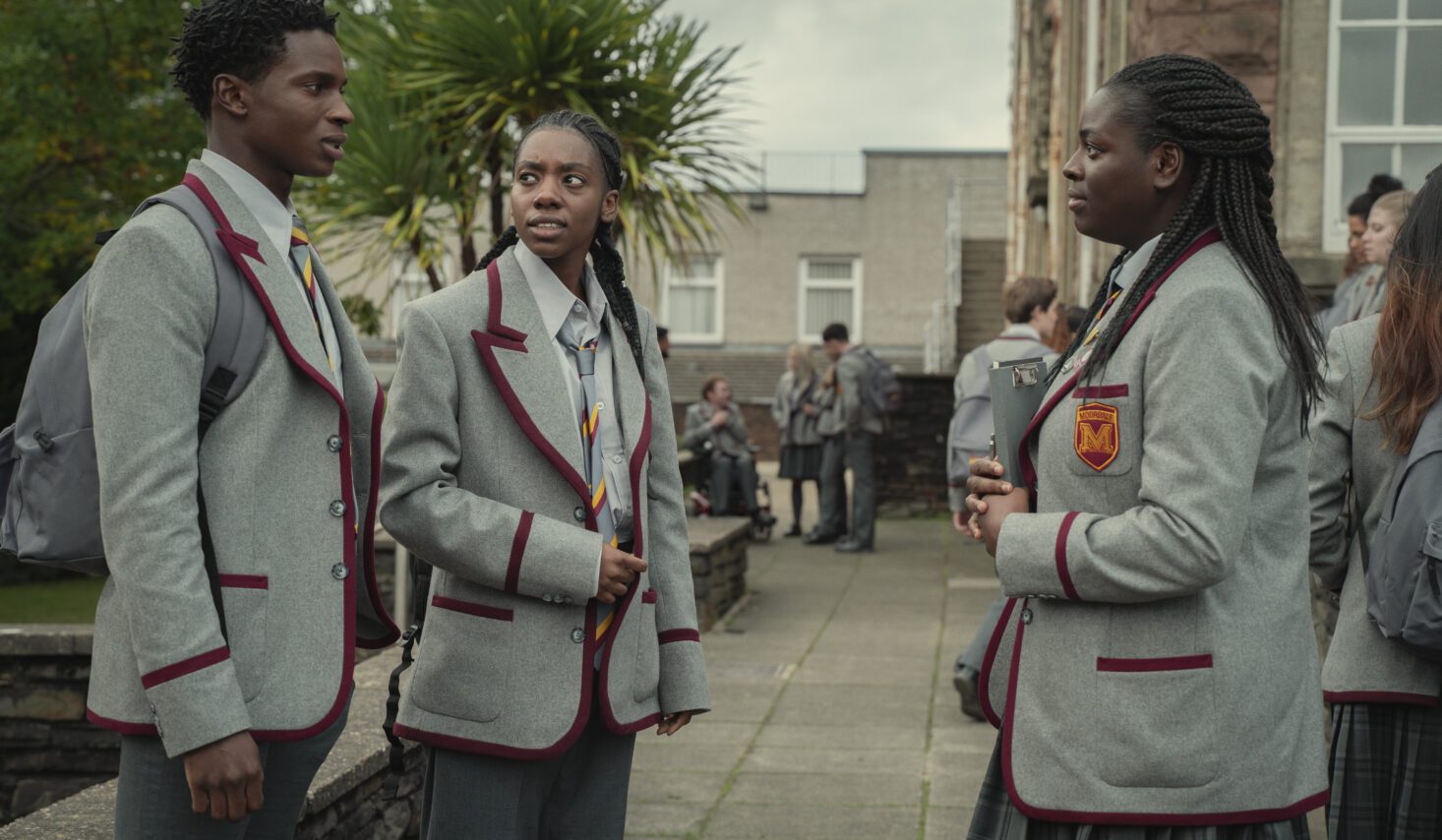
Sex Education isn’t the first modern show to bust out a gleaming plotline of underrepresentation. Shows from Pose and It’s A Sin to Euphoria and Atypical have all scratched the surface of timely characters and well-scripted roles. For Dua, the experience on the mega-show Sex Education has been golden. “The writers and producers are really amazing. They really cared about authenticity and thoughtfulness and being able to showcase this phenomenal person in a way that isn’t necessarily harming anyone,” they tell GAY TIMES. In fact, Sex Education, like Channel 4’s It’s A Sin, ensured LGBTQ+ sensitivity by hiring on-site consultants. “We had non-binary consultants and non-binary people in the writing rooms who talked to me. We had an intimacy coordinator and a non-binary consultant to ask us questions that a cis person wouldn’t necessarily ask.” Mid-explanation Dua breaks into laughter, recalling a playful moment with the team. “I tried to get them to make Cal a lesbian, but Cal has free will and cannot be bogged down to my specific identities,” they joke.
Whether it was trying to add their twist on their character or setting into the rhythm of acting, Dua admits they found the experience illuminating, particularly on a teen show fighting taboos around sex and sexual health. Growing up in Minneapolis, Minnesota, Dua attended a local high school and recalls the questionable sex education lessons. “It’s pretty bad in the States, I’m not gonna lie, it sucks. When I was in high school, they rolled in a TV and had really cis-sexist, transphobic, and misogynistic understandings of sex and what the body does,” they explain.
Despite the attempt at informing students, what struck Dua most was the lack of LGBTQ+ inclusive education. “My school had a GSA program (the Gay-Straight Alliance). The students would go in and educate people on LGBTQ+ identity, queerness and other things, but my only experiences with LGBTQ+ identity or learning about that in high school was learning the workshop stuff so that I could go to different classes to teach the kids who are my age.” A lot has changed since then. In the last few years, Dua Saleh has made a name for themself as an experimental artist ahead of the curve. So much so, they credit their music for how they snagged their Sex Education gig. “They said they Googled me, so I don’t know if they would have found me if I wasn’t doing music. People are paying attention to me because there aren’t many non-binary musicians who are in the public eye,” they say. “I’m not necessarily the biggest artist in the world. I’m no Megan The Stallion, but for an indie artist, I’ve done pretty well for myself.”
It would be cool to have a category-specific to non-binary people because it’s an umbrella term, and so many people would fall into that category.
The significance of standing out is something to salute, but, for Dua, it’s much more than that; it’s an opportunity to represent. “I’ve been building a narrative around my personal identity and having representation for trans and queer Sudani people, Black people, general people of colour, and Muslims,” they explain. “All the different identities are stacked on top of each other and it’s really important for us to see ourselves reflected in media, in music and in any tangible art form. I don’t think I would have gotten this role without my music. I’m very grateful for all the work that I’ve done talking about my identities and expressing the importance of representation for non-binary people who share my identities. Shout out to music!”
Speaking of inclusivity, our conversation takes a turn to awards — several of which Sex Education have scooped up. As more high-profile LGBTQ+ actors are stepping forward announcing their identities, we discuss the future of award show categories. “It would be cool to have a category-specific to non-binary people because it’s an umbrella term, and so many people would fall into that category,” Dua says, mulling over a thought. “Netflix has been up for a bunch of awards for all the work that they’ve been doing, Sex Education too. Amy Lou Wood won a BAFTA which is really phenomenal for her amazing acting in Sex Education. Ncuti Gatwa and Emma Mackey were nominated as well.”
For Dua, the power in pushing change lies, in some part, in outward visibility and cultural acceptance. “Even in popular culture, people like Sam Smith, Demi Lovato, Kehlani came out as non-binary. Elliott Page as well. There are so many different people that are coming out publicly. In last year’s US census, a million people identified as non-binary and that doesn’t account for the people who don’t want to take the census. It wouldn’t make sense for them to not do that, especially when people are learning more about their indigenous understandings of gender or they’re learning they don’t have to subscribe to the Western binary in general. It would be goofy for them not to create another category.”
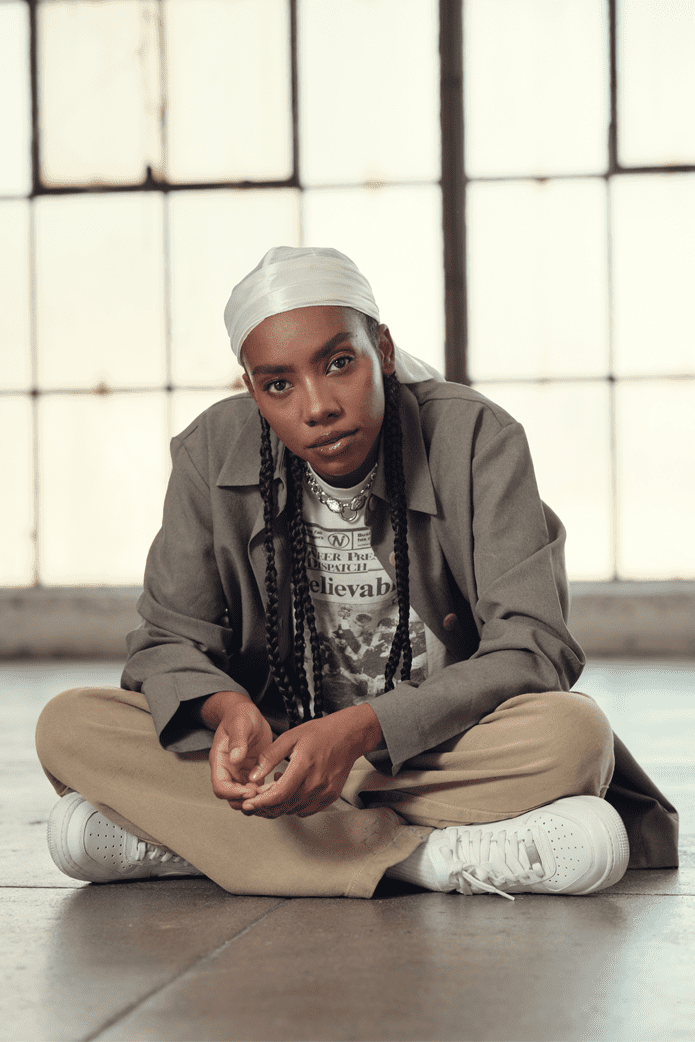
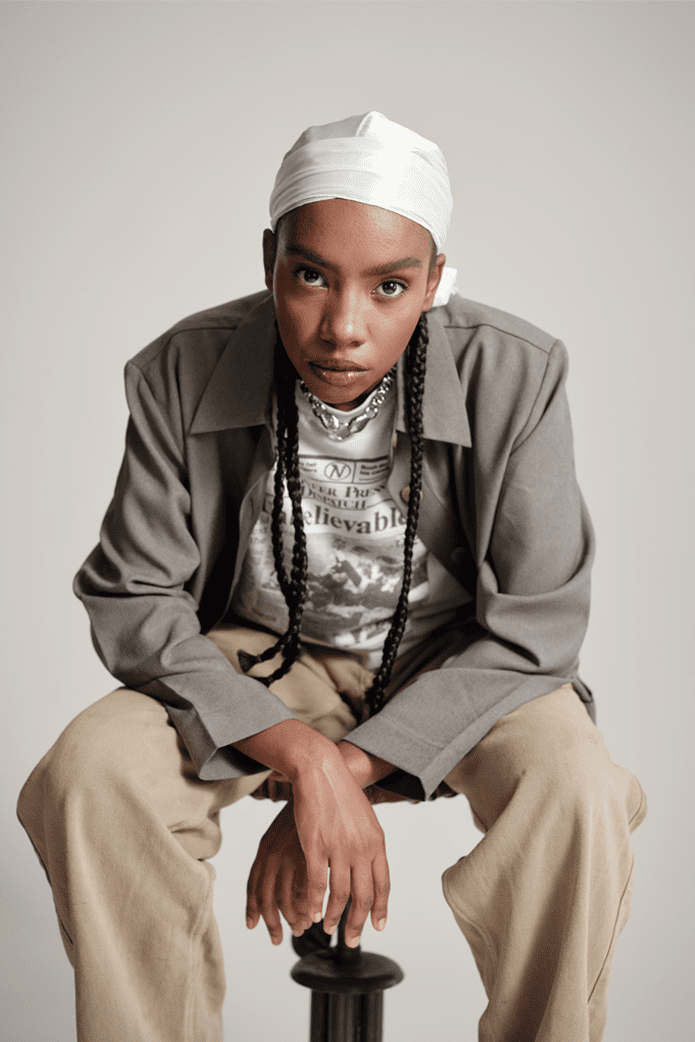
Dua’s call for revolution in the acting industry doesn’t stop there. Whether it be Hollywood or streaming giants, the musician-turned-actor is hyper-aware of the inroads that need to be made to facilitate change. “There are avenues that are opening for that to happen. In order for it to be truly authentic, there need to be trans people in all of those respective jobs and being able to write, create, produce, direct, and be at the forefront of their own stories, instead of being added on as an afterthought,” they begin. “Sex Education did pretty well in the way that they approached it, even though it’s new to them. It was something that they were thinking of.” However, the buck doesn’t stop there. Sex Education and It’s A Sin have paved the way with intimacy coordinators and having input from diverse creatives, but the oversight, for Dua, continues to fall on trans inclusivity. “Trans people are at risk every day. Black trans women are still being killed and people are not bringing attention to the ways that that violence can translate into our everyday life.”
There’s so much that I’ve gotten by being trans and being around trans and queer people, and that I’m very thankful for
Brutality towards the Black trans community is something Dua cannot shake. In June 2020, Tony McDade, a Black trans man was shot and killed by police. “There was a Black trans man who was killed in Tennessee around the same time as George Floyd. Nobody was really talking about that story. People across the world are being met with violence and systemic oppression,” Dua recalls, visibly frustrated. The intersection of their activism and industry entry has put them in a unique position; one that makes them self-aware of their privilege and the opportunities that come with it. “A lot of the trans actors that I know don’t have non-binary consultants for their shows. They don’t have people in the writing rooms. They’re not asking the people who are acting or what they think about the script before they continue with it,” they say. “I feel very privileged to be acting as Cal in Sex Education, but a lot more work needs to be done if they want the stories to be sustainable.”
With Sex Education now wrapped up, Dua has been taking downtime back home in the US. Their days have been sporadically packed with interviews and press talks, but they’re grateful for it as it comes. If anything, it has given them more space to think over their presence in the creative industry. “I wouldn’t be as creative if I wasn’t non-binary, trans and queer, I don’t think. No shade to anybody,” they laugh. “I think there’s a wealth of artistic knowledge and understanding that has historically been passed down from generations of queerness.”
The imprint of queerness in their artistry, visuals and creative tone is intentional and powerfully vocal. Take their 2020 EP ROSETTA or 2019 compilation Nūr. Everything Dua has made is an experimental ode to their roots. “It’s in the way that we talk, the ways that we decorate ourselves in our bodies, the ways that we engage with understandings of the world and put them into art,” they explain. “I think a lot of avant-garde art wouldn’t exist without trans and queer people. A lot of modern understandings of like makeup wouldn’t exist without drag artists and trans women being at the forefront and popularising things from the 1700s onwards. We’ve done a lot for culture and that’s my favourite part, artistically and culturally speaking. There’s so much that I’ve gotten by being trans and being around trans and queer people, and that I’m very thankful for.” As we wrap up and share our goodbyes, Dua, again, shows their mindfulness in crossing paths across the creative sectors: “It’s nice to see another Muslim in the industry,” they say to me, “because that doesn’t happen often.”
You can watch the season 3 trailer of Sex Education here or below:
